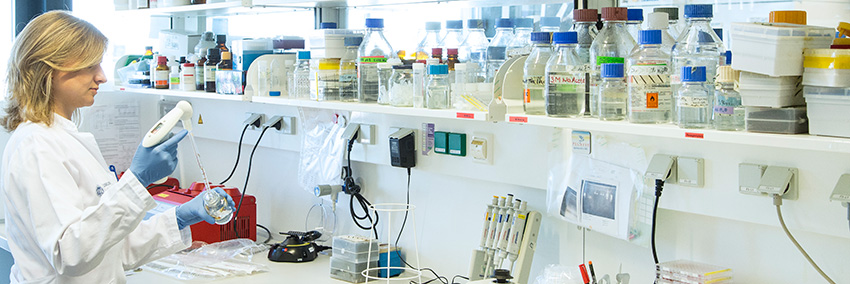
The Career Advancement Program (CAP) has been specifically designed to support high-potential mid-career scientists of the Medical Faculty aiming for full professorships or equivalent leadership positions at non-university research institutions. If required the CMMC provides temporary access to high-quality laboratory space in the CMMC Research Building, access to the research infrastructure and administrative support as well as support aimed at enhancing their scientific expertise and professional skills base. The CMMC currently supports the following 12 CAP-Groups.

My research group entitled “Computational Biology of Aging” focuses primarily on the application of computational approaches to explore the interplay between multiple layers of biological organisation and their phenotypic characterisation. Specifically, this entails the analysis of several cohorts at the University Hospital Cologne (UHC) where data integration, predictive/statistical modelling and network biology approaches are the key methodologies that are applied to improve our understanding of the associated clinical questions. In parallel, my group continues to explore the impact of exogenous stress on organism function. In recent years this was centred on non-human species to improve our understanding of the impact of exogenous stressors and explore the thresholds at which adverse events occur with plans to explore human centered data via new grant opportunities.

A major factor limiting the survival of cancer patients is the lack of durable treatment response and the emergence of therapy resistant disease. The causal genetic and epigenetic mechanisms driving tumor evolution and therapy resistance are still largely unknown. However, we consider a detailed knowledge of these processes vital in order to improve existing and design novel treatment strategies. Accordingly, our group explores the molecular determinants of tumor development and therapy response by combining forward genetic screens and data-driven molecular biology with a special focus on lung and head and neck cancer.

The kidney contains a dense network of immune cells, which is of central importance for organ homeostasis but can also lead to tissue damage and ultimately renal failure. While both kidney biology and renal immunology have made tremendous progress in the past, the interaction between kidney cells like tubulus cells or podocytes and immune cells is still poorly understood.
We are currently investigating the following areas:

In recent years, the emerging field of immunometabolism has started to unveil the role of metabolism in shaping immune function, and to reveal how modulating cell or organismal metabolism can affect immune cell differentiation.
“With my team I am investigating how mitochondrial function is regulated in T cells in health and disease and how its dysregulation during ageing or pathology results in impaired or altered immune response. My long-term goal is to clarify the transcriptional and micro-environmental mechanisms involved in the development of long-term immune memory and define how metabolic plasticity modulates cellular responses to stress and immune chal-lenges” Mauro Corrado comments, whose research group is located in the CECAD Research Building.

Mitochondria are mobile organelles that constantly fuse and divide. These properties play a central role in quality control processes and energy expenditure. Mitochondrial fusion depends on the mitofusin proteins MFN1 and MFN2. Dysfunction of MFN2 causes the neuropathy Charcot-Marie-Tooth type 2A, is associated with Parkinson’s disease and with cardiovascular pathologies, but is also linked with type 2 diabetes and obesity and with non-alcoholic fatty liver disease and cancer. We aim at understanding at the molecular level the disease-underlying functions of MFN2.

Dr. Hoyer’s research group focuses on myeloid leukocyte biology in cardiovascular disease. Inflammation’s involvement in various cardiovascular pathologies has garnered much attention in recent years, and the role and function of myeloid leukocytes are increasingly recognized. Certain features of myeloid cells promote tissue maintenance and repair. Excessive inflammatory activity, on the contrary, exacerbates injury and impacts systemic complications. Mechanisms shifting myeloid cells’ responses towards healing while minimizing collateral tissue damage remain insufficiently understood. Aiming to find novel therapeutic ways to mitigate cardiovascular inflammation and halt disease progression, Felix Hoyer’s group focuses on how

The definition of cancer hallmarks has significantly expanded in the last decades and cancer is no longer considered a disease of only malignant cells, but a highly complex tissue comprising tumor cells and their tumor microenvironment (TME).
“My research is based on the finding that non-receptor tyrosine kinases are functionally essential for the creation of a proneoplastic, microenvironmental niche. The distinct, cell-type specific patterns of substrate activation induced by kinases may lead to a differential activation of transcription factors and, as a consequence, to a cell type-specific modulation of cellular functions”, Nguyen comments and adds ”Because many kinase inhibitors are readily available, understanding these kinases’ functions in the TME will be useful to design improved anti-cancer therapies, particularly to target the immune- and metastatic niches”.

Vision is a key sensory function. Clear vision depends on transparency of the structures of the visual axis. Consequently, normal corneal tissue (the “windscreen of the eye”) is in an avascular and low inflammatory state. The limbal epithelial stem cells (LESC) maintain the integrity of the corneal epithelium thus preventing neovascularization, stromal scarring and conjunctivalisation. Although it has been proven both clinically and experimentally that LESCs destruction compromises corneal avascularity, the exact mechanisms by which this is achieved remain unidentified.
Our group focuses on elucidating these mechanisms and aims to identify new LESC-related regulators of corneal neovascularisation which will lead to new therapeutic options (we are part of FOR2240, “(Lymph)angiogenesis and cellular immunity in inflammatory diseases of the eye”).

Cell death is important for physiological processes, such as embryonic development, immune tolerance, fight against pathogens, etc. However, uncontrolled cell death can lead to chronic inflammation, tissue damage and autoimmunity. Inflammatory gene activation was first believed to be the sole responsible for triggering cell death and for eliciting an immune response. Yet, this concept has largely been challenged. Cell death programmes as well as gene activation induce the release specific factors that impact on immune responses and affect disease pathogenesis differently. Our goal is to study the impact of different forms of programmed cell death and to dissect the contribution of cell death versus inflammatory gene activation in disease. Ultimately, we aim to exploit this knowledge for therapeutic purposes by developing highly targeted therapies against chronic inflammation and autoimmune diseases.

Interactions between viruses and the immune system of an infected patient have a strong influence on both organisms. After infection, the human immune system aims to improve its ability to detect and combat the respective virus while the pathogen can develop escape mutations that allow him to evade these immune responses. If these mutations also do not alter the ‘viral fitness’ (its ability to replicate and infect more cells), this viral quasispecies will have an evolutionary advantage over the ancestral virus, will finally outnumber him and force the human immune system to adapt its response again.
With the overall aim to improve future antiviral therapies and vaccines, our group aims to
i) better understand these host-virus interactions,
ii) implement novel techniques to rapidly detect viral escape and
iii) develop strategies that hamper viral escape.

The emergence of multidrug-resistant (MDR) bacteria is a major public health concern with increasing mortality throughout the world. While nowadays new drugs and therapeutic approaches are on the rise for many diseases, the clinical implementation of innovative therapeutics in the treatment of bacterial infections is stagnating. To overcome the limited amount of new antibiotics, the development of immunotherapies, which enhance the host immune response, seems reasonable. This approach might be particularly effective in immunocompromised patients such as critically ill patients or patients receiving chemotherapy. Accordingly, our group explores the host-pathogen interactions of clinically relevant bacteria to develop new powerful immunotherapeutic strategies in the fight against MDR bacteria.

Frontotemporal Dementia (FTD) and variants thereof, such as Progressive Supranuclear Palsy (PSP), Picks disease (PiD) and Corticobasal Degeneration (CBD) can be classified as ageing-associated taupathies. These taupathies, as well as Alzheimer’s disease (AD), the most prevalent form of dementia, and other TAU and mitochondria related dementia-causing syndromes are devastating disorders that impose a huge burden on society. Genetic variants, splicing defects and pathological axodendritic distribution of the protein TAU cause or significantly contribute to these diseases. Understanding the neurobiological, cellular and molecular mechanisms underlying TAU physiology in disease relevant human cells is crucial for developing successful therapeutic approaches for AD and associated diseases.
Our recently established junior research group: “Functional Genetics of Neurodegeneration and Neurological Disease” currently works on the elucidation of pathomechanisms of genetic and sporadic forms of tauopathies, including AD and mitochondriopathies. By better understanding the molecular disease mechanisms, we strive to identify and test novel therapeutic approaches for these currently incurable diseases. As model systems, we focus on human iPSC-derived neurons (iNs), TAU-humanized mice and primary neurons derrived from these, as well as several other cell types (e.g. patient-derived primary fibroblasts). We use lentiviruses (LV), state of the art microscopy (i.a. calcium imaging, photoconversion/optogenetics, STED-nanoscopy) and omics approaches ((sc)RNAseq and proteomics) to elucidate disease mechanisms and test therapeutic approaches in disease-relevant human neurons and in TAU-humanized mice.
CAP 25 - David Pla-Martin
Modulate mitochondrial quality control to decelerate disease progression
CAP 23 - Lydia Meder
Deciphering therapeutic targets in the lung cancer metastatic cascade
CAP 16 - Grit Herter-Sprie
Harnessing CDK4/6 imhinition to promote T cell-mediated anti-tumor immunity
CAP 13 - Jan Herter
CD4 T cell reactivation in peripheral tissues
CAP 12 - Hans A. Schlößer
Tumor-specific endogenous immune response and immune escape in gastrointestinal cancer
CAP 11 - Deniz Hos
The contribution of myeloid cells to corneal neovascular disease
CAP 10 - Miguel A Alcazar
Pursuing novel molecular mechanisms and treatment strategies in bronchopulmonary dysplasia: functional role of Krüppel-like factor 4 (Klf4)
CAP 09 - Roland Ullrich
Targeting tumor angiogenesis
CAP 08 - Jan Rybniker
Comprehensive host-cell based antibiotic drug discovery
CAP 07 - Stephan Rosenkranz
Role of PI3Kd in atherosclerosis
CAP 06 - Martin Peifer
Computational cancer genomics
CAP 04 - Catherin Niemann
Molecular function of Lef1 mutations (E45K/S61P and DNLef1) in epithelial tissues and cancer
CAP 03 - Helmar Lehman
Mechanisms of axonal injury in neuroinflammation and neurotoxicity
CAP 02 - Mathieu Clement-Ziza
Mechanisms of tumor development: intrinsic and extrinsic control of cell proliferation and tissue invasion
CAP 01 - Paul T Brinkötter
Mitochondrial dysfunction and glomerular disease